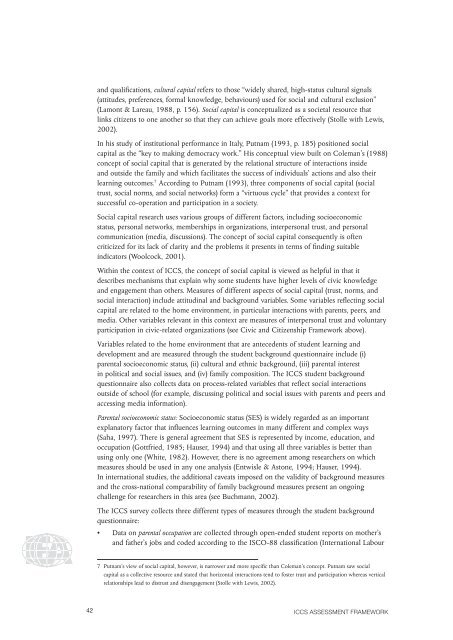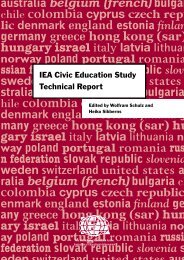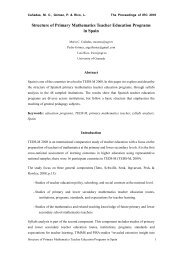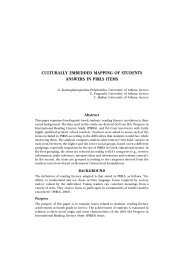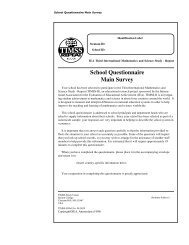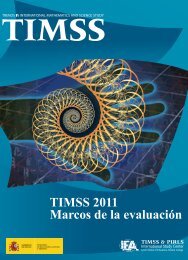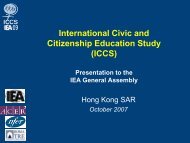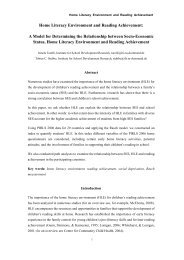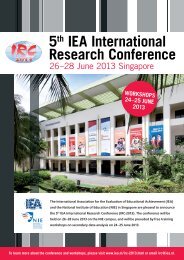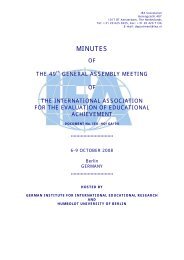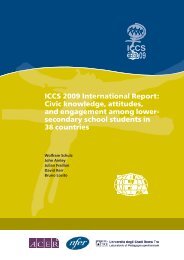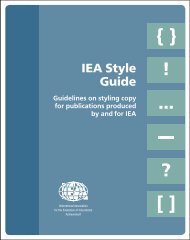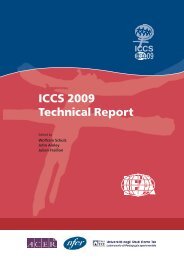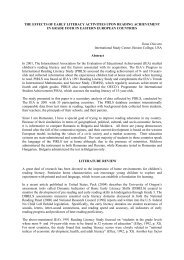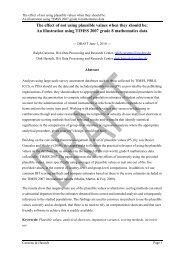International civic and citizenship education study - iccs - IEA
International civic and citizenship education study - iccs - IEA
International civic and citizenship education study - iccs - IEA
- TAGS
- civic
- citizenship
- iccs
- www.iea.nl
You also want an ePaper? Increase the reach of your titles
YUMPU automatically turns print PDFs into web optimized ePapers that Google loves.
<strong>and</strong> qualifications, cultural capital refers to those “widely shared, high-status cultural signals<br />
(attitudes, preferences, formal knowledge, behaviours) used for social <strong>and</strong> cultural exclusion”<br />
(Lamont & Lareau, 1988, p. 156). Social capital is conceptualized as a societal resource that<br />
links citizens to one another so that they can achieve goals more effectively (Stolle with Lewis,<br />
2002).<br />
In his <strong>study</strong> of institutional performance in Italy, Putnam (1993, p. 185) positioned social<br />
capital as the “key to making democracy work.” His conceptual view built on Coleman’s (1988)<br />
concept of social capital that is generated by the relational structure of interactions inside<br />
<strong>and</strong> outside the family <strong>and</strong> which facilitates the success of individuals’ actions <strong>and</strong> also their<br />
learning outcomes. 7 According to Putnam (1993), three components of social capital (social<br />
trust, social norms, <strong>and</strong> social networks) form a “virtuous cycle” that provides a context for<br />
successful co-operation <strong>and</strong> participation in a society.<br />
Social capital research uses various groups of different factors, including socioeconomic<br />
status, personal networks, memberships in organizations, interpersonal trust, <strong>and</strong> personal<br />
communication (media, discussions). The concept of social capital consequently is often<br />
criticized for its lack of clarity <strong>and</strong> the problems it presents in terms of finding suitable<br />
indicators (Woolcock, 2001).<br />
Within the context of ICCS, the concept of social capital is viewed as helpful in that it<br />
describes mechanisms that explain why some students have higher levels of <strong>civic</strong> knowledge<br />
<strong>and</strong> engagement than others. Measures of different aspects of social capital (trust, norms, <strong>and</strong><br />
social interaction) include attitudinal <strong>and</strong> background variables. Some variables reflecting social<br />
capital are related to the home environment, in particular interactions with parents, peers, <strong>and</strong><br />
media. Other variables relevant in this context are measures of interpersonal trust <strong>and</strong> voluntary<br />
participation in <strong>civic</strong>-related organizations (see Civic <strong>and</strong> Citizenship Framework above).<br />
Variables related to the home environment that are antecedents of student learning <strong>and</strong><br />
development <strong>and</strong> are measured through the student background questionnaire include (i)<br />
parental socioeconomic status, (ii) cultural <strong>and</strong> ethnic background, (iii) parental interest<br />
in political <strong>and</strong> social issues, <strong>and</strong> (iv) family composition. The ICCS student background<br />
questionnaire also collects data on process-related variables that reflect social interactions<br />
outside of school (for example, discussing political <strong>and</strong> social issues with parents <strong>and</strong> peers <strong>and</strong><br />
accessing media information).<br />
Parental socioeconomic status: Socioeconomic status (SES) is widely regarded as an important<br />
explanatory factor that influences learning outcomes in many different <strong>and</strong> complex ways<br />
(Saha, 1997). There is general agreement that SES is represented by income, <strong>education</strong>, <strong>and</strong><br />
occupation (Gottfried, 1985; Hauser, 1994) <strong>and</strong> that using all three variables is better than<br />
using only one (White, 1982). However, there is no agreement among researchers on which<br />
measures should be used in any one analysis (Entwisle & Astone, 1994; Hauser, 1994).<br />
In international studies, the additional caveats imposed on the validity of background measures<br />
<strong>and</strong> the cross-national comparability of family background measures present an ongoing<br />
challenge for researchers in this area (see Buchmann, 2002).<br />
The ICCS survey collects three different types of measures through the student background<br />
questionnaire:<br />
• Data on parental occupation are collected through open-ended student reports on mother’s<br />
<strong>and</strong> father’s jobs <strong>and</strong> coded according to the ISCO-88 classification (<strong>International</strong> Labour<br />
7 Putnam’s view of social capital, however, is narrower <strong>and</strong> more specific than Coleman’s concept. Putnam saw social<br />
capital as a collective resource <strong>and</strong> stated that horizontal interactions tend to foster trust <strong>and</strong> participation whereas vertical<br />
relationships lead to distrust <strong>and</strong> disengagement (Stolle with Lewis, 2002).<br />
42 ICCS ASSeSSment FrAmework


